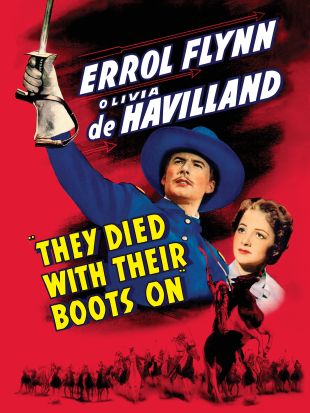Errol Flynn portrays George Armstrong Custer with dash and bravado in this romanticized 1941 epic directed by Raoul Walsh. The film chronicles Custer's life from his West Point days to his death in 1876 at the Little Bighorn River in Montana, then part of the Dakota Territory. Exciting battle scenes, chivalric love, and a spirited Max Steiner music score make the production a thrilling movie experience in spite of the film's numerous historical inaccuracies. The flamboyant Flynn plays the vain, charming, headstrong Custer with the same kind of flair that characterized Flynn's performance as the title character in The Adventures of Robin Hood. Olivia de Havilland, who dazzled audiences as Maid Marian in that 1938 classic, plays Custer's wife Libby in this film with elegance and grace -- and fierce loyalty to her husband. Among the supporting actors, portly Sydney Greenstreet stands out as Lt. Gen. Winfield Scott, who celebrates upstart Custer's heroics at the Battle of Gettysburg with an order of stewed onions. The motion picture helped popularize one of the most famous marching songs in history, "Garryowen," a Gaelic word meaning "Garden of Owen." After the government sent Custer to the Dakota Territory to take charge of the Seventh Cavalry, Custer adopted the lively air as the cavalry's own after he heard an Irish soldier singing it. The Battle of Little Bighorn takes place near the end of the film after Crazy Horse (Anthony Quinn), chief of the Oglala Sioux, marshals warriors numbering between 2,500 and 4,000 and annihilates Custer and his 655 men. Though the film is mostly pure Hollywood, it is also mostly pure entertainment -- and one reason why one of the favorite activities of little boys in 1941 was to play "cowboys and Indians."

They Died With Their Boots On (1941)
Directed by Raoul Walsh
Genres - Action, Adventure, Drama, Romance, War, Western |
Sub-Genres - Biopic [feature], Historical Epic, Cavalry Film |
Release Date - Jan 1, 1942 (USA) |
Run Time - 140 min. |
Countries - United States |
MPAA Rating - NR
Share on